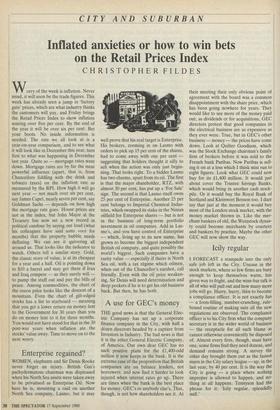CITY AND SUBURBAN
Inflated anxieties or how to win bets on the Retail Prices Index
CHRISTOPHER FILDES
Worry of the week is inflation. Never mind, it will soon be the trade figures. This week has already seen a jump in 'factory gate' prices, which are what industry thinks the customers will pay, and Friday brings the Retail Prices Index to show inflation soaring over five per cent. By the end of the year it will be over six per cent. Bet your boots. No inside information is needed. The rate we all look at is a year-on-year comparison, and to see what it will look like in December this year, turn first to what was happening in December last year. Quite so — mortgage rates went down. Mortgage rates are by far the most powerful influence (apart, that is, from Chancellors fiddling with the drink and tobacco taxes) on the inflation rate as measured by the RPI. How high it will go next year — not much over six per cent, say James Capel, nearly seven per cent, say Goldman Sachs — depends on how high the mortgage rate goes. House prices are not in the index, but John Major at the Treasury has now set a new record in political candour by saying out loud (what his colleagues have said sotto voce for months) that the property bubble needs deflating. We can see it quivering all around us. That looks like the indicator to watch. Others tell a similar story. Gold, the classic store of value, is at its cheapest for a year and a half. Oil is pointing down to $10 a barrel and may get there if Iran and Iraq compete — as they surely will to pump the stuff out and pay the bills of peace. Among commodities, the chart of the cocoa price looks like the descent of a mountain. Even the chart of gilt-edged stocks has a list to starboard — meaning that you get a lower return on money lent to the Government for 30 years than you do on money lent to it for three months. You would not have stood for that in the 30 post-war years when inflation ate the stocks' value away. Time to move on to the next worry.


































































 Previous page
Previous page